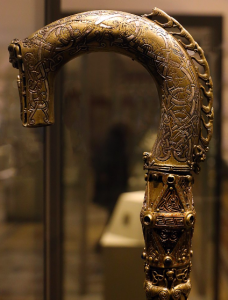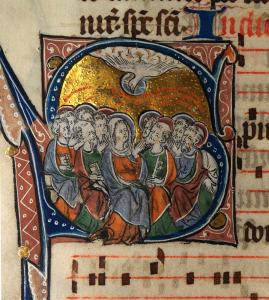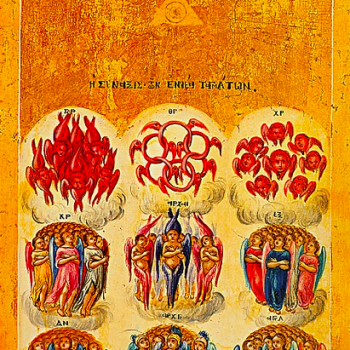The GOATS (Gospel Of this pAsT Sunday)
Moving right along, here are the translation and notes for this past Sunday’s Gospel. The Fourth Sunday of Easter is informally named Good Shepherd Sunday in honor of this text.

Crook of the eleventh-century Clonmacnoise
Crozier, in the National Museum of Ireland
in Dublin. Photo by Wikimedia user Sailko,
used under a CC BY-SA 3.0 license (source).
John 10.11-18, RSV-CE
I am the gooda shepherd. The good shepherd lays down his lifeb for the sheep. He who is a hireling and not a shepherd, whose own the sheep are not, sees the wolf coming and leavesc the sheep and flees; and the wolf snatches them and scatters them.d He flees because he is a hireling and cares nothing for the sheep. I am the good shepherd; I know my own and my own know me, as the Father knows me and I know the Father; and I lay down my life for the sheep. And I have other sheep, that are not of this fold; I must bring them also, and they will heed my voice.e So there shall be one flock, one shepherd. For this reason the Father loves me,f because I lay down my life, that I may take it again. No one takes it from me, but I lay it down of my own accord.g I have power to lay it down, and I have power to take it again; this chargeh I have received from my Father.
John 10.11-18, my translation
I am the gooda shepherd; the good shepherd puts his life asideb for the sheep; the hired help, and not the shepherd—the sheep are not his own; he observes a wolf coming and remitsc the sheep and flees: and the wolf snatches some and scatters the rest;d because he is hired help, and does not care about the sheep. I am the good shepherd, and I know mine, and they know me, just as my Father knows me and I know my Father, and I put my life aside for the sheep. I also have other sheep, which are not from this enclosure; I must lead them here to me, and they will hear my voice,e and there will be one herd, one shepherd. This is why the Father lovesf me, because I put my life aside, in order that I may again take it up. No one takes it from me, but I put it aside of my own accord.g I have authority to put it aside, and I have authority again to take it up; I took this commissionh from my Father.

Textual Notes
a. good: There are a few different Greek terms for “good”; the nearest equivalent to the English adjective is probably agathos [ἀγαθός], but the one used here is a little more standard in Greek: kalos [καλός], which originally meant not so much “good” in a moral or social sense, but “beautiful, fine, fair.” (Under this meaning, it appears as one of the “three transcendentals,” or properties of being, codified by Aquinas: to Agathon [τό ἀγαθόν], or the Good; to Alēthēs [τό ἀληθής], or the True; and to Kalon [τό Καλόν], or the Beautiful.)
b. lays down his life/puts his life aside: Both the verb and the noun here, tithēmi [τίθημι] and psüchē [ψυχή], are worthy of note (not that they’re unusual words! quite the opposite). Tithēmi, since it’s the simple verb “to put, place, set [somewhere],” gets drawn into dozens of idiomatic expressions, and “lays down his life,” although it replaces a Greek expression with an English one, is a perfectly good translation. However, I like my more literal rendering better; in particular, I like the way it highlights that the shepherd’s mind his on the sheep, and not on how noble he is for sacrificing himself.
Psüchē, meanwhile, is the normal word for “soul” or “life”; as its two hissing consonants hint at, it probably meant “breath” in the beginning. Here, it still primarily means “bodily life,” unlike the greatly-altered English term psyche. Plays on the two concepts of bodily life and the animating soul are common in ancient Christian writings on martyrdom; Matthew 16 shows Jesus himself as the exemplar of this wordplay.
c. leaves/remits: I went over my use of “remit” to mean “forgive” in textual note g of my next-to-last installment. Handily, the word “remit” used to have a slightly larger set of meanings, including “cancel, dismiss; abandon.” Those meanings are vanishingly rare today, but I’ve pressed them into service here anyway.

Agony in the Garden, Andrea Mantegna (c. 1460).
A favorite technique of Mantegna’s was to use
very low horizons; note how the hills and
buildings all loom upwards.
d. snatches them and scatters them/snatches some and scatters the rest: This irresistibly puts me in mind of the scene in Gethsemane in Matthew 26.31.
e. they will heed my voice/they will hear my voice: Sheep are actually quite remarkable for this. Despite being—notoriously!—rather stupid creatures, they have an incredible knack for picking out individual voices, both ovine* and human; a lamb can pick out its own mother-ewe or shepherd in a crowd of noise.
Theologically, this points to what the Latin tradition calls the sensus fidelium or “perception of the faithful.” The Church’s infallibility is expressed through her institutional body, but that institution is not the origin of the Church’s charism of infallibility. The charism comes from the same entity that indwells the Church, the Holy Ghost. Most of us need to train ourselves with a lot of silent, interior listening before we can recognize the sensus fidelium prompting us to affirm this or reject that. The simpler souls among us tend to fare better, as illustrated in a famous story about the trial of St. Joan of Arc—I think it’s true, actually, though I haven’t double-checked. An inquisitor tried to entrap her by asking her whether she knew herself to be in a state of grace. (If she said no, then obviously she was guilty of some sin; if she said yes, she was committing the sin of presumption.) What St. Joan said was this: “If I am not, may God put me there; if I am, may God keep me there.”
f. loves: Irksomely, there seems to be no easy way to convey the different uses of the four Greek terms for “to love.” Here, as so often in John, the verb is agapaō, related to the noun agapē or “unconditional love.”**
g. of my own accord: The word “accord” is an idiomatic insertion; a more literal translation would be “from myself.” I decided against this on the grounds that the context would have made it too ambiguous in English.
h. charge/commission: The Greek term here, entolē [ἐντολή], comes from the verb entellō [ἐντέλλω], “to order, command”; given the context, I thought it was a nice grace note for a noun from entellō to echo apostellō [ἀποστέλλω], the verb from which we get “apostle.”

Illuminated capital from a 14th-cent.
missal, depicting Pentecost.
*That which pertains to sheep is ovine in the same way that which pertains to dogs is canine. (The word comes from the Lat. ovis ‘sheep.’)
**The other three terms are: stergō [στέργω]/storgē [στοργή], familial affection; phileō [φιλέω]/philia [φιλία], the love among friends; and eraō [ἐράω]/erōs [ἔρως]. It’s important to note that these distinctions were not rigorously observed—phileō in particular intruded on the function of every other word for “love.”













